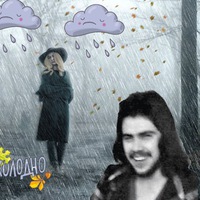Но вот среди пророков, среди людей, которые Богу послужили сердцем неразделенным, всей большой силой души, есть один, память которого мы совершаем сегодня и кого Бог назвал величайшим среди тех, которые рождены на земле. Это Иоанн Креститель. И действительно, когда вдумаешься в его судьбу, кажется, нет судьбы более величественной и более трагичной.
Вспомните первое, что говорится о нем в Евангелии от Марка: «Он глас вопиющий в пустыне». Он только голос, он настолько стал единым, настолько уже не отличим от своего служения, что он стал только Божиим голосом, только благовестником; словно его как человека, человека плоти и крови, человека, который может тосковать и страдать, и молиться, и искать, и стоять, в конечном итоге, перед грядущей смертью, — словно этого человека нет. Он и его призвание — одно и то же; он — голос Господень, звучащий, гремящий среди пустыни людской; той пустыни, где души пусты, потому что вокруг Иоанна люди были, а пустыня от этого оставалась неизменной.
И дальше Сам Господь говорит о нем в Евангелии, что он — друг Жениха. Друг, который так сильно, так крепко любит жениха и невесту, что он способен, забыв себя, служить их любви, и служить тем, чтобы никогда не оказаться лишним, никогда не быть там и тогда, когда он не нужен. Он — друг, который способен защитить любовь жениха и невесты и остаться вне, хранителем тайны этой любви. Тут тоже великая тайна человека, который способен как бы не стать для того, чтобы что-то большее, нежели он, было. И дальше сам Креститель говорит о себе по отношению к Господу: «Мне надо умаляться, сходить на нет, для того чтобы Он возрос». Надо, чтобы обо мне забыли, чтобы только о Нем помнили, надо, чтобы мои ученики от меня отвернулись и ушли, подобно Андрею и Иоанну на берегах Иордана реки, для того, чтобы последовать неразделенным сердцем только за Ним: я живу только для того, чтобы меня не стало!
И последнее — страшный образ Иоанна, когда он уже был в темнице, когда уже вокруг него суживался круг приходящей смерти, когда не было у него уже выхода, когда эта колоссально великая душа заколебалась. Шла на него смерть, кончалась жизнь, где ничего у него не было своего, в прошлом был только подвиг отречения от себя, а впереди — мрак. И в этот момент, когда заколебался в нем дух, послал он учеников спросить у Христа: Ты ли Тот, Которого мы ожидали? Если Тот, то стоило в юных летах заживо умереть. Если Он — Тот, стоило умаляться из года в год, чтобы Иоанна забыли и только образ Грядущего возрастал в глазах людей. Если Он — Тот, тогда стоило теперь и умирать уже последним умиранием, потому что все, для чего Иоанн жил, было исполнено и совершено. Но вдруг Он не Тот? Тогда потеряно всё: и юность, и величайшая сила зрелых лет, всё погублено, всё бессмысленно; и еще страшнее, что случилось это потому, что Бог будто ‘обманул’. Бог, призвавший Иоанна в пустыне, Бог, отведший его от людей, Бог, вдохновивший его к подвигу самоумирания. Неужели Бог обманул, и жизнь прошла, и возврата нет?
И вот, послав учеников ко Христу с вопросом: «Ты ли Тот?», Иоанн не получает прямого, утешающего ответа. Христос не отвечает ему: «Да, Я Тот, иди с миром!» Он только дает пророку ответ другого пророка о том, что слепые прозревают, что хромые ходят, что мертвые воскресают, что нищие благовествуют. Он дает ответ из Исаии, но Своих слов не прибавляет, — ничего, кроме одного грозного предупреждения: «Блажен тот, кто не соблазнится о Мне. Пойдите, скажите Иоанну». И этот ответ достиг Иоанна в предсмертном его ожидании: верь до конца, верь, не требуя ни свидетельств, ни доказательств, ни знамений. Верь, потому что слышал ты внутри, в глубинах души твоей, глас Господень, повелевающий творить дело пророка. Пророки в своем порой величайшем подвиге каким-то образом могут опереться на Господа. Иоанна же Бог поддерживает только тем, что повелел ему быть Предтечей и ради этого явить предельную веру, уверенность в вещах невидимых. И вот почему дух захватывает, когда мы думаем о нем, и вот почему каждый раз, когда мы думаем о подвиге, которому предела нет, мы вспоминаем Иоанна.
из проповеди Митрополита Антония Сурожского
Вспомните первое, что говорится о нем в Евангелии от Марка: «Он глас вопиющий в пустыне». Он только голос, он настолько стал единым, настолько уже не отличим от своего служения, что он стал только Божиим голосом, только благовестником; словно его как человека, человека плоти и крови, человека, который может тосковать и страдать, и молиться, и искать, и стоять, в конечном итоге, перед грядущей смертью, — словно этого человека нет. Он и его призвание — одно и то же; он — голос Господень, звучащий, гремящий среди пустыни людской; той пустыни, где души пусты, потому что вокруг Иоанна люди были, а пустыня от этого оставалась неизменной.
И дальше Сам Господь говорит о нем в Евангелии, что он — друг Жениха. Друг, который так сильно, так крепко любит жениха и невесту, что он способен, забыв себя, служить их любви, и служить тем, чтобы никогда не оказаться лишним, никогда не быть там и тогда, когда он не нужен. Он — друг, который способен защитить любовь жениха и невесты и остаться вне, хранителем тайны этой любви. Тут тоже великая тайна человека, который способен как бы не стать для того, чтобы что-то большее, нежели он, было. И дальше сам Креститель говорит о себе по отношению к Господу: «Мне надо умаляться, сходить на нет, для того чтобы Он возрос». Надо, чтобы обо мне забыли, чтобы только о Нем помнили, надо, чтобы мои ученики от меня отвернулись и ушли, подобно Андрею и Иоанну на берегах Иордана реки, для того, чтобы последовать неразделенным сердцем только за Ним: я живу только для того, чтобы меня не стало!
И последнее — страшный образ Иоанна, когда он уже был в темнице, когда уже вокруг него суживался круг приходящей смерти, когда не было у него уже выхода, когда эта колоссально великая душа заколебалась. Шла на него смерть, кончалась жизнь, где ничего у него не было своего, в прошлом был только подвиг отречения от себя, а впереди — мрак. И в этот момент, когда заколебался в нем дух, послал он учеников спросить у Христа: Ты ли Тот, Которого мы ожидали? Если Тот, то стоило в юных летах заживо умереть. Если Он — Тот, стоило умаляться из года в год, чтобы Иоанна забыли и только образ Грядущего возрастал в глазах людей. Если Он — Тот, тогда стоило теперь и умирать уже последним умиранием, потому что все, для чего Иоанн жил, было исполнено и совершено. Но вдруг Он не Тот? Тогда потеряно всё: и юность, и величайшая сила зрелых лет, всё погублено, всё бессмысленно; и еще страшнее, что случилось это потому, что Бог будто ‘обманул’. Бог, призвавший Иоанна в пустыне, Бог, отведший его от людей, Бог, вдохновивший его к подвигу самоумирания. Неужели Бог обманул, и жизнь прошла, и возврата нет?
И вот, послав учеников ко Христу с вопросом: «Ты ли Тот?», Иоанн не получает прямого, утешающего ответа. Христос не отвечает ему: «Да, Я Тот, иди с миром!» Он только дает пророку ответ другого пророка о том, что слепые прозревают, что хромые ходят, что мертвые воскресают, что нищие благовествуют. Он дает ответ из Исаии, но Своих слов не прибавляет, — ничего, кроме одного грозного предупреждения: «Блажен тот, кто не соблазнится о Мне. Пойдите, скажите Иоанну». И этот ответ достиг Иоанна в предсмертном его ожидании: верь до конца, верь, не требуя ни свидетельств, ни доказательств, ни знамений. Верь, потому что слышал ты внутри, в глубинах души твоей, глас Господень, повелевающий творить дело пророка. Пророки в своем порой величайшем подвиге каким-то образом могут опереться на Господа. Иоанна же Бог поддерживает только тем, что повелел ему быть Предтечей и ради этого явить предельную веру, уверенность в вещах невидимых. И вот почему дух захватывает, когда мы думаем о нем, и вот почему каждый раз, когда мы думаем о подвиге, которому предела нет, мы вспоминаем Иоанна.
из проповеди Митрополита Антония Сурожского
But among the prophets, among the people who served God as an undivided heart, with all the great strength of the soul, there is one whose memory we commit today and whom God called the greatest among those who are born on earth. This is John the Baptist. Indeed, when you think about his fate, it seems that there is no fate more majestic and more tragic.
Remember the first thing that is said of him in the Gospel of Mark: "He is a voice crying in the wilderness." He is only a voice, he has become so united, so indistinguishable from his ministry that he has become only God's voice, only an evangelist; as if he as a person, a person of flesh and blood, a person who can yearn and suffer, and pray, and seek, and stand, ultimately, before the coming death - as if this person is not. He and his calling are one and the same; he is the voice of the Lord, sounding, thundering in the wilderness of man; that desert where souls are empty, because there were people around John, and the desert from this remained unchanged.
And further the Lord Himself speaks of him in the Gospel that he is a friend of the Bridegroom. A friend who loves the bride and groom so much, that he is capable, having forgotten himself, of serving their love, and serving to never be superfluous, to never be there even when he is not needed. He is a friend who is able to protect the love of the bride and groom and stay outside, the keeper of the secret of this love. Here, too, is the great mystery of a man who is capable, as it were, of not becoming so that there is something more than he is. And then the Baptist himself says about himself in relation to the Lord: “I need to diminish, go to naught in order for Him to grow.” It is necessary that they forget about me, only remember Him, it is necessary that my disciples turn away from me and leave, like Andrew and John on the banks of the Jordan River, in order to follow an unrequited heart only after Him: I live only for so I’m gone!
And the last - the terrible image of John, when he was already in prison, when the circle of coming death was already narrowing around him, when he had no way out, when this colossally great soul hesitated. Death came upon him, life ended where he had nothing of his own, in the past there was only the feat of renouncing himself, and in front of him was darkness. And at that moment, when the spirit hesitated in him, he sent the disciples to ask Christ: Are you the One whom we expected? If Thoth, then it was worthwhile to die alive in his youth. If He is He, it was worth belittling from year to year, so that John would be forgotten and only the image of the Coming One would grow in the eyes of people. If He is He, then it was worth it now to die by the last death, because everything for which John lived was fulfilled and completed. But suddenly He is not the One? Then everything is lost: youth and the greatest power of mature years, everything is ruined, everything is meaningless; and even worse, it happened because God seemed to ‘cheated’. God, who called John in the wilderness, God, who led him away from people, God, who inspired him to the feat of self-dying. Has God deceived, and life has passed, and there is no return?
And so, having sent the disciples to Christ with the question: “Are You That?”, John does not receive a direct, comforting answer. Christ does not answer him: “Yes, I am One, go in peace!” He only gives the prophet the answer of another prophet that the blind see, that the lame walk, that the dead rise, that the poor evangelized. He gives an answer from Isaiah, but does not add His words — nothing but one formidable warning: “Blessed is he who is not tempted about Me. Go tell John. ” And this answer reached John in his dying expectation: believe to the end, believe without requiring any evidence, no evidence, no signs. Believe, because you heard inside, in the depths of your soul, the voice of the Lord commanding you to do the work of the prophet. The prophets in their sometimes greatest feat can somehow rely on the Lord. God only supports John by ordering him to be the Forerunner and for the sake of this to show the utmost faith, confidence in things invisible. And that's why the breathtaking when we think about it, and that's why every time we think about a feat that has no limit, we remember John.
from the sermon of Metropolitan Anthony of Sourozh
Remember the first thing that is said of him in the Gospel of Mark: "He is a voice crying in the wilderness." He is only a voice, he has become so united, so indistinguishable from his ministry that he has become only God's voice, only an evangelist; as if he as a person, a person of flesh and blood, a person who can yearn and suffer, and pray, and seek, and stand, ultimately, before the coming death - as if this person is not. He and his calling are one and the same; he is the voice of the Lord, sounding, thundering in the wilderness of man; that desert where souls are empty, because there were people around John, and the desert from this remained unchanged.
And further the Lord Himself speaks of him in the Gospel that he is a friend of the Bridegroom. A friend who loves the bride and groom so much, that he is capable, having forgotten himself, of serving their love, and serving to never be superfluous, to never be there even when he is not needed. He is a friend who is able to protect the love of the bride and groom and stay outside, the keeper of the secret of this love. Here, too, is the great mystery of a man who is capable, as it were, of not becoming so that there is something more than he is. And then the Baptist himself says about himself in relation to the Lord: “I need to diminish, go to naught in order for Him to grow.” It is necessary that they forget about me, only remember Him, it is necessary that my disciples turn away from me and leave, like Andrew and John on the banks of the Jordan River, in order to follow an unrequited heart only after Him: I live only for so I’m gone!
And the last - the terrible image of John, when he was already in prison, when the circle of coming death was already narrowing around him, when he had no way out, when this colossally great soul hesitated. Death came upon him, life ended where he had nothing of his own, in the past there was only the feat of renouncing himself, and in front of him was darkness. And at that moment, when the spirit hesitated in him, he sent the disciples to ask Christ: Are you the One whom we expected? If Thoth, then it was worthwhile to die alive in his youth. If He is He, it was worth belittling from year to year, so that John would be forgotten and only the image of the Coming One would grow in the eyes of people. If He is He, then it was worth it now to die by the last death, because everything for which John lived was fulfilled and completed. But suddenly He is not the One? Then everything is lost: youth and the greatest power of mature years, everything is ruined, everything is meaningless; and even worse, it happened because God seemed to ‘cheated’. God, who called John in the wilderness, God, who led him away from people, God, who inspired him to the feat of self-dying. Has God deceived, and life has passed, and there is no return?
And so, having sent the disciples to Christ with the question: “Are You That?”, John does not receive a direct, comforting answer. Christ does not answer him: “Yes, I am One, go in peace!” He only gives the prophet the answer of another prophet that the blind see, that the lame walk, that the dead rise, that the poor evangelized. He gives an answer from Isaiah, but does not add His words — nothing but one formidable warning: “Blessed is he who is not tempted about Me. Go tell John. ” And this answer reached John in his dying expectation: believe to the end, believe without requiring any evidence, no evidence, no signs. Believe, because you heard inside, in the depths of your soul, the voice of the Lord commanding you to do the work of the prophet. The prophets in their sometimes greatest feat can somehow rely on the Lord. God only supports John by ordering him to be the Forerunner and for the sake of this to show the utmost faith, confidence in things invisible. And that's why the breathtaking when we think about it, and that's why every time we think about a feat that has no limit, we remember John.
from the sermon of Metropolitan Anthony of Sourozh

У записи 7 лайков,
0 репостов.
0 репостов.
Эту запись оставил(а) на своей стене Вероника Вовденко




























